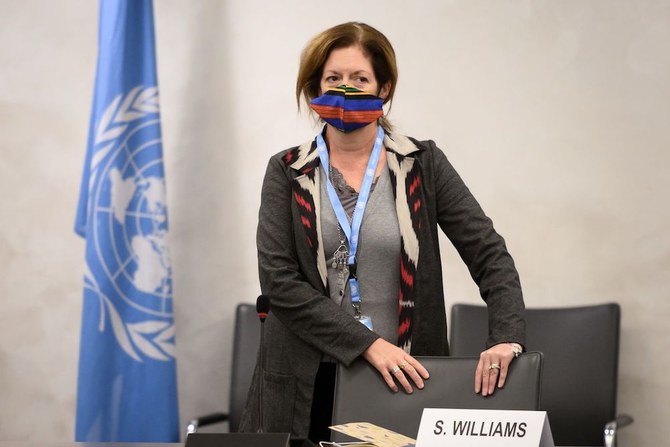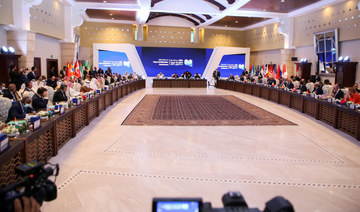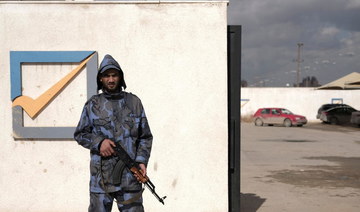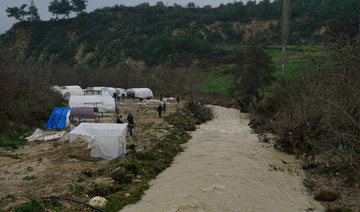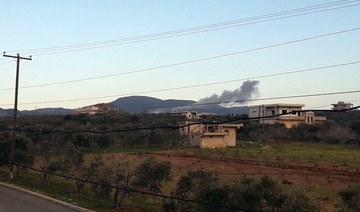NEW YORK: Mediators need to take into account the lessons learned in Libya in the past two years and focus on “creating milestones” for the country’s political transition, rather than fixating on the time frame involved, according to Elham Saudi, co-founder and director of Lawyers for Justice in Libya.
These milestones include an electoral law, a code for conducting elections, and a solid constitutional basis “that appropriately sequences presidential and legislative elections in line with the broader road map to complete (the) transition effectively,” he said.
Addressing the UN Security Council on Monday during its regular meeting about developments in Libya, Saudi said that when these steps are implemented, elections will naturally follow and will be “far easier to manage, protect and successfully deliver.”
Stephanie Williams, UN Secretary-General Antonio Guterres’s special adviser on Libya, recently reiterated the importance of holding elections “in the shortest possible time frame.” She said this month that “it is possible, and needed, to have elections before the end of June.”
However, Saudi said that “focusing on the dates for the elections instead of a clear process to facilitate them risks once again compromising due process for the sake of perceived political expediency.”
Growing polarization among political powers in the country and disputes over key aspects of the electoral process — including shortcomings in the legal framework for the elections, contradictory court rulings on candidacies, and political and security concerns as cited by the High National commission for Elections — resulted in the postponement of the elections, which had been scheduled to take place on Dec. 24 last year.
Saudi reminded members of the Security Council that “accountability is a prerequisite to political progress. Poorly defined and fundamentally weak vetting criteria applied to candidates applying for elections resulted in individuals implicated in corruption or crimes against humanity and human rights violations, including persons who have been indicted by the ICC (International Criminal Court), being accepted as candidates.”
Following the postponement of polling in December, Libya’s House of Representatives established a “road map committee” to develop a new path toward national elections. The committee will present its first report for debate on Tuesday in Tripoli.
Rosemary DiCarlo, the UN’s under-secretary-general for political and peacebuilding affairs, welcomed what she described as renewed efforts by Libya’s Presidency Council to advance national reconciliation but lamented the political uncertainty in the run-up to the elections. which she said has “negatively impacted the overall security situation, including in Tripoli, resulting in shifting alliances among armed groups affiliated with certain presidential candidates.”
She expressed concern about the human rights situation in Libya, citing “incidents of elections-related violence and attacks based on political affiliation, as well as threats and violence against members of the judiciary involved in proceedings on eligibility of electoral candidates, and against journalists, activists and individuals expressing political views.”
DiCarlo added: “Such incidents are an obstacle to creating a conducive environment for free, fair, peaceful and credible elections.”
Taher El-Sonni, Libya’s permanent representative to the UN, told the Security Council that while some people had been surprised by the postponement of elections, it had been widely expected.
“In light of the crisis of trust and the absence of a constitution for the country, or a consensual constitutional rule as advocated by most political forces now, it will be very difficult to conduct these elections successfully because the elections are supposed to be a means of political participation and not a means of predominance and exclusion, and a means to support stability and not an end in itself that may open the way for a new conflict,” he said.
El-Sonni called on the UN to offer more “serious and effective” support to the electoral process and send teams to assess the requirements on the ground.
“This would be a clear message to all about the seriousness of the international community in achieving elections that everyone aspires to, without questioning it or its results,” he said.
The Libyan envoy invited the council to “actively contribute” to the processes of national reconciliation and transitional justice, “two concomitant and essential tracks that have unfortunately been lost during the past years, although they are the main basis for the success of any political solution that leads to the stability of the country.”
He also once again called on the African Union to support his country’s efforts in this area.
Ambassador Jeffrey DeLaurentis, senior advisor for special political affairs to the US mission at the UN, said it is time for the wishes of the millions of Libyans who have registered to vote to be respected.
“It is time to move beyond backroom deals between a small circle of powerful individuals backed by armed groups, carving up spoils and protecting their positions,” he said “The Libyan people are ready to decide their own future.
“Those vying to lead Libya must see that the Libyan people will only accept leadership empowered by elections and that they will only tolerate so much delay.”
Like many other ambassadors at the meeting, DeLaurentis also addressed the migrant crisis and reports of violence and abuses directed at migrants, asylum seekers and refugees in Libya.
“Libyan authorities must close illicit detention centers, end arbitrary detention practices and permit unhindered humanitarian access to affected populations,” he said.



